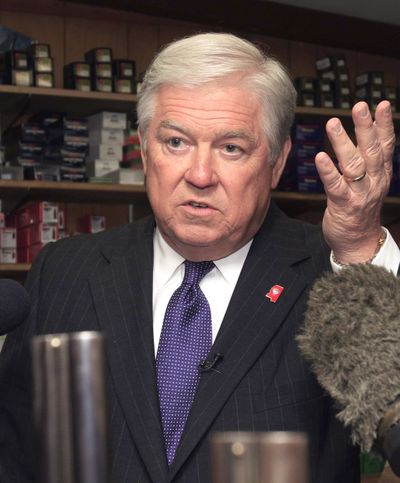Barbour won’t run in 2012
Romney and Pawlenty may gain as a result

WASHINGTON – Mississippi Gov. Haley Barbour said Monday that he won’t seek the Republican nomination for president next year after all, a sign that a crowded but tentative field of GOP rivals is starting to firm up.
Barbour, 63, a former lobbyist known for his keen political instincts, fundraising prowess and drawl, and who has led the national Republican Party and Republican Governors Association, said in a statement that he could not promise supporters he’d have the “absolute fire in the belly” needed to run and serve. “I cannot offer that with certainty, and total certainty is required.”
His announcement followed visits to key primary states including South Carolina, New Hampshire and Iowa, and early polling that showed his support in the low single digits.
Former Massachusetts Gov. Mitt Romney and former Minnesota Gov. Tim Pawlenty have announced exploratory committees. Several others who are considering or flirting with runs include former Arkansas Gov. Mike Huckabee, businessman and TV celebrity Donald Trump, former House Speaker Newt Gingrich, U.S. Ambassador to China and former Utah Gov. Jon Huntsman, Rep. Michele Bachmann of Minnesota, Indiana Gov. Mitch Daniels, former Alaska Gov. Sarah Palin, former Pennsylvania Sen. Rick Santorum and businessman Herman Cain.
It’s not clear that Barbour’s decision will have a major effect on the race.
Craig Robinson, founder of the website The Iowa Republican and a former state party political director, said Barbour’s decision not to run probably helps Pawlenty most in Iowa and Romney most nationally. Like Barbour, the two men have been emphasizing the economy and appealing to business-focused Republicans.
“You have more and more candidates in Iowa carving up the social issues, but Barbour talked about the issues that won us the last election – jobs and the economy. Iowa’s still wide open, and Barbour was quietly assembling folks here,” Robinson said.
Steffen Schmidt, political science professor at Iowa State University, said he was somewhat surprised by Barbour’s decision and thinks it may be a sign that “Republicans are more and more thinking that 2012 is not going to be a winning year.” Said Schmidt of Barbour: “He’s a Southern good ol’ boy and all that, but people liked him when he came to speak, and who’s got good poll numbers? Nobody does.”
Barbour has garnered attention for his advocacy for his state post-Hurricane Katrina and again following last year’s BP oil spill in the Gulf of Mexico. He’s also been criticized of painting a revisionist picture in recent months of GOP and Southern attitudes during the Civil Rights Era.
Political scientists said Barbour likely calculated he could not overcome the regional and name-recognition hurdles needed to advance quickly enough to compete.